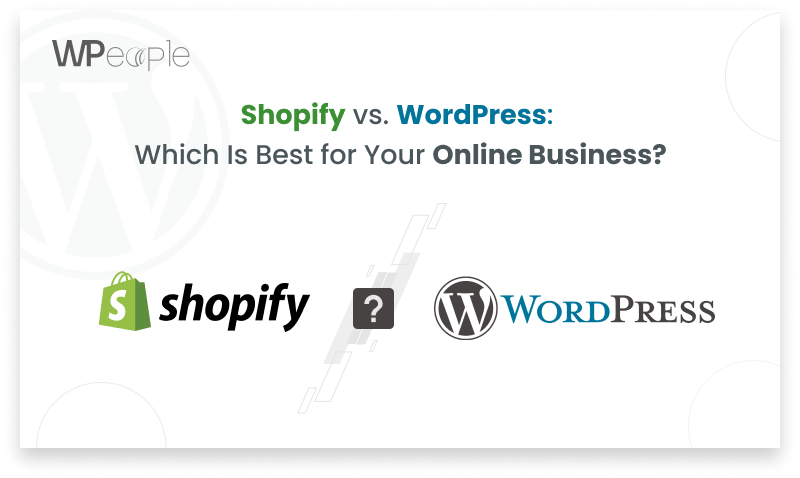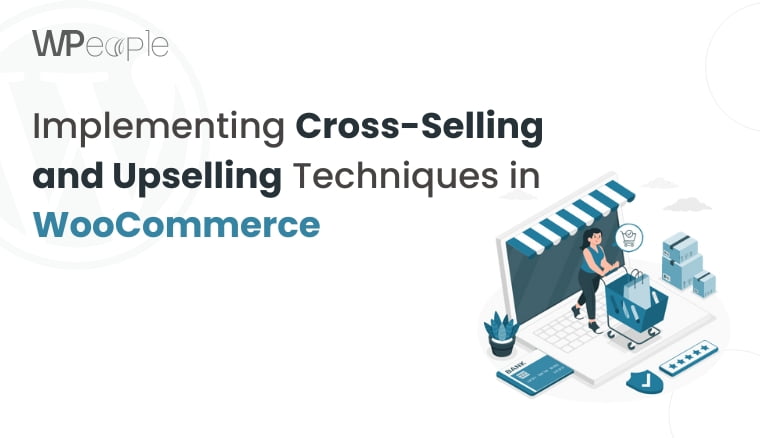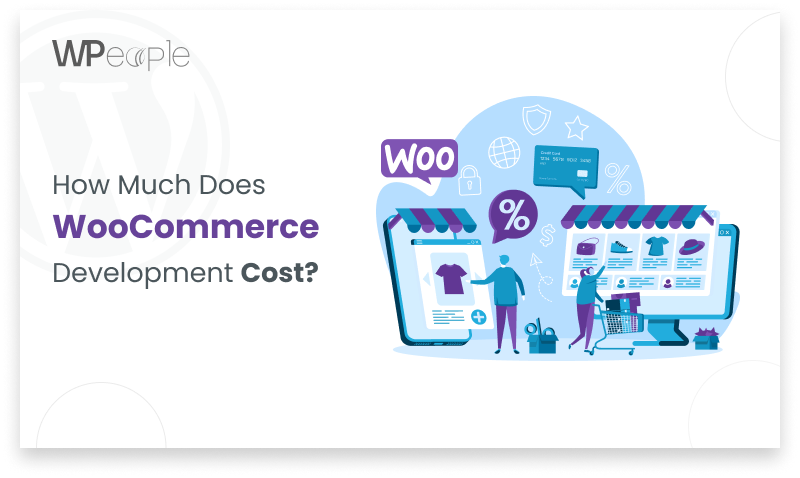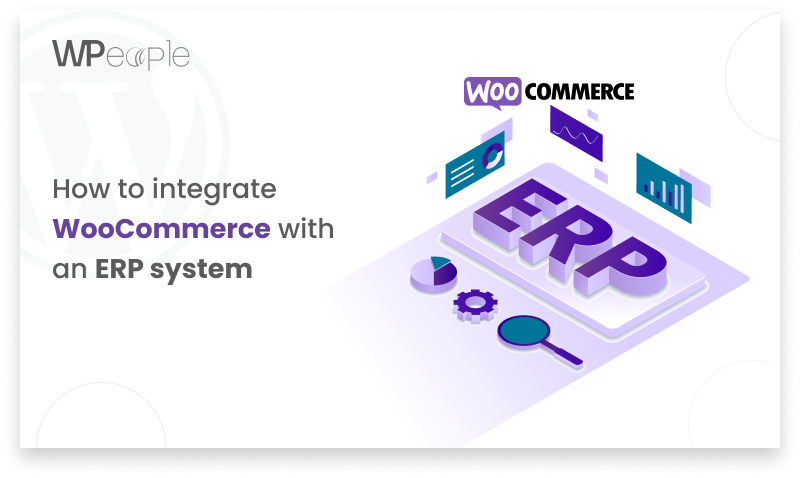
Introduction:
The choice of an appropriate platform stands as a pivotal decision, capable of exerting a profound impact on the trajectory of your online business. As business owners immersed in the digital landscape, you undoubtedly find yourself grappling with the Shopify vs. WordPress dilemma, a critical juncture where the decision made can significantly shape the course of your e-commerce venture. This comprehensive guide endeavors to navigate through the intricacies of both platforms, arming you with the requisite knowledge to make a judicious and informed decision that aligns seamlessly with the unique needs of your online Store.
What is WordPress?
WordPress, fundamentally a content management system, allows you to schedule content on your website. Its popularity stems from its versatility, offering a myriad of plugins to create diverse websites. Particularly noteworthy is the integration of WooCommerce, a powerful platform facilitating easy store establishment. At WPeople, we present the WooCommerce Starter Bundle, a fully integrated package containing essential plugins like Shopping Cart Abandonment Recovery, Kadence Email Designer, WooCommerce Shipping & Tax, and more, providing a seamless start to your online store.
What is Shopify?
Shopify, established in 2006, is a leading hosted ecommerce platform that has gained global prominence over the past 15 years. Renowned for its simplicity, it provides millions of ecommerce store owners with an uncomplicated way to establish their online presence, featuring a user-friendly interface with drag-and-drop functionality. While it appeals to those seeking an easy store launch, experienced ecommerce store owners often encounter certain drawbacks.
Understanding Shopify and WordPress for Your Online Business
Shopify: Simplifying Your Online Store
Shopify’s SEO Optimization:
Shopify doesn’t just provide a platform to showcase your products; it’s a powerful ally in the realm of search engine optimization (SEO). Its user-friendly interface not only makes navigation a breeze for your customers but also aligns seamlessly with SEO best practices. Discover how Shopify ensures your online store is not just visually appealing but also easily discoverable by potential customers.
Quick Setup for SEO Impact:
One of Shopify’s main benefits is its quick setup, which allows business owners to launch their online stores promptly. With a wide range of professionally designed templates, Shopify enhances the look of your store while positively impacting SEO. The drag-and-drop functionality simplifies customization, ensuring that your store is not only operational quickly but also making an immediate impact in terms of SEO.
2. WordPress: Customization and SEO Synergy
SEO-Friendly Framework of WordPress:
In contrast to Shopify’s user-friendliness, WordPress, especially when paired with the WooCommerce plugin, offers a flexible and SEO-friendly framework. Discover the SEO advantages of WordPress and how its framework allows for deep customization and optimization. WordPress’s adaptability, combined with its focus on content, enhances the online visibility of your e-commerce venture.
Content Marketing and SEO with WordPress:
Content plays a crucial role in digital marketing, and WordPress excels in providing tools for effective content marketing and SEO. Explore how WordPress equips you with features to create compelling content that resonates with your audience and improves your search engine rankings. Whether it’s blog posts or product descriptions, WordPress empowers e-commerce entrepreneurs to strategically leverage content for SEO success.
Decoding the Decision-Making Factors
1. Cost Considerations:
Shopify’s Subscription Model:
As you contemplate the cost implications, Shopify’s subscription-based model comes into focus. Understand the tiers, ranging from basic plans to advanced ones, and assess how these align with your budgetary constraints. Shopify’s transparent pricing structure ensures that you are aware of the features each plan offers, enabling you to make a cost-effective decision aligned with your business needs.
WordPress’s Open-Source Advantage:
On the flip side, WordPress embraces an open-source nature. Dive into this advantageous aspect, understanding how it impacts your budget. Evaluate potential expenses such as hosting, premium themes, and plugins. This exploration ensures that your investment aligns precisely with the features you require for a robust and customizable online store.
2. Scalability:
Shopify’s Scalability Plans:
Growth is a common goal for e-commerce businesses, and Shopify is designed to accommodate businesses of all sizes. Explore Shopify’s scalability plans, learning how they align with your long-term growth trajectory. Whether you are a startup or an established enterprise, Shopify’s scalability features ensure that your online store can expand seamlessly as your business grows.
WordPress Optimization:
WordPress, too, offers scalability, but it requires strategic optimization. Understand the optimization strategies within WordPress that guarantee your online store seamlessly scales with increasing traffic and business expansion. From server optimization to efficient plugin usage, WordPress provides a flexible environment for your e-commerce venture to thrive.
3. Technical Expertise:
Shopify’s User-Friendly Approach:
Technical expertise varies among e-commerce entrepreneurs, and Shopify caters to those with limited technical know-how. Embrace the simplicity of Shopify, exploring how the platform provides a hassle-free experience in managing online stores. Whether you are a tech enthusiast or a beginner, Shopify ensures that the technical aspect of your e-commerce journey is user-friendly and accessible.
WordPress Customization:
Recognize the technical prowess required for advanced customization with WordPress. While Shopify streamlines the process, WordPress provides an intricate level of control over your website’s design and functionality. Understand how WordPress caters to business owners who seek complete control and are willing to navigate the technical intricacies for a tailor-made online store.
4. Support and Community:
Shopify’s Customer Support:
A robust foundation for your e-commerce journey is built on reliable support. Explore the dedicated customer support provided by Shopify, ensuring that assistance is readily available when needed. From technical queries to operational challenges, Shopify’s support system is designed to provide swift solutions, laying the groundwork for a resilient online store.
WordPress Community Strength:
Beyond dedicated support, WordPress boasts a vast community strength within its ecosystem. Uncover the dynamics of this community, exploring forums and documentation that serve as invaluable resources for troubleshooting and continuous learning. The WordPress community ensures that you are part of a collaborative network, enhancing your journey as an e-commerce entrepreneur.
These detailed insights aim to provide e-commerce entrepreneurs with a nuanced understanding of each platform’s strengths and considerations. Whether you prioritize user-friendliness, customization, scalability, or community support, this guide equips you with the knowledge to make an informed decision tailored to the unique needs of your online business.
Conclusion: Making an Informed Choice for E-commerce Success
As you navigate the Shopify vs. WordPress debate, armed with insights into their SEO-friendly features, cost considerations, scalability options, and technical aspects, you’re better equipped to make a strategic decision for your e-commerce business. Whether it’s the streamlined simplicity of Shopify or the customizable power of WordPress, your choice is the cornerstone of your online success. Let this guide be your compass, steering you towards a thriving e-commerce venture that stands out in the digital landscape.
FAQs
Q1: How does the combination of WordPress and WooCommerce offer superior SEO advantages compared to Shopify, and why is SEO crucial for e-commerce success?
A: WordPress, especially when paired with the WooCommerce plugin, harnesses a flexible and SEO-friendly framework. This deep integration with SEO practices contributes to enhanced online visibility, making it a strategic choice for businesses aiming to rank higher in search engine results.
Q2: I want complete control over the design and functionality of my online store. Which platform, Shopify or WordPress, is better for customization?
A: If you prioritize complete control and are willing to navigate technical intricacies, WordPress offers a higher level of customization. Shopify, while customizable, may have some limitations compared to the flexibility of WordPress.
Q3: For a small business looking to minimize costs, can WordPress be a more cost-effective option compared to Shopify, considering its open-source nature?
A: WordPress, being open-source, provides a cost-effective solution for small businesses. With various free plugins and themes available, coupled with careful budgeting for hosting, it can be a more economical choice for those conscious of their budget.
Consult with Our WordPress Experts On:
- WooCommerce Store
- Plugin Development
- Support & maintenance




